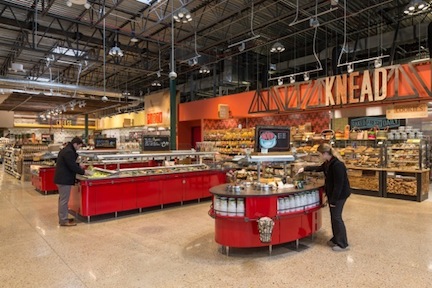Portland, OR – The Green Building Initiative® (GBI) has announced a wave of Green Globes certifications for new grocery stores across the nation.
The properties include New Seasons Markets in Oregon, and Whole Foods, Price Chopper, Aldi’s, Harris Teeter, Wegmans, and Publix stores across the country.
New Seasons director of construction and facilities Wayne Pipes said Green Globes certification helps validate the company’s sustainability story. “We were the first B-Corp grocer in the world—sustainability is part of our DNA,” Pipes said. “We're classified a Zero-Waste company, and using less energy is part of who we are. Green Globes help make our mission clear throughout the community at large as we continue to grow.”
“Grocers’ need for refrigeration make energy-efficient construction and operations especially critical, both from an environmental and an economic standpoint,” Jerry Yudelson, president of Green Building Initiative, said. “Green Globes is ideal for retail environments because of its integration with the ENERGY STAR® program—which includes supermarkets as a building occupancy category—and because it accommodates different building scenarios by not applying penalties for features that aren’t applicable.”
To date, nearly 50 Whole Foods stores have been certified or are now in the Green Globes process. In 2013 Whole Foods expanded its sustainability efforts by taking its first existing building through Green Globes, a store in the Hollywood district of Portland, Oregon, which earned a Three Green Globes Rating.
“If you’re looking for ways to reduce your building footprint or wondering where your facility stands on the green spectrum, this [Green Globes] process has a lot of merit,” Whole Foods Pacific Northwest Region construction manager Bob Gordon said. “The comprehensive evaluation looked at both how the building was built and is operated. It will help us piece together a preventative maintenance program for the whole region. In the long-term, the Green Globes suggestions save money and enhance the facility.”
The Green Globes certification process also incorporates the EPA’s GreenChill Store Certification Program for Food Retailers, which recognizes individual stores for using environmentally friendlier commercial refrigeration systems. Stores also can achieve certification under GreenChill itself.
About the Green Building Initiative™ - The GBI is a nonprofit organization and American National Standards Institute (ANSI) Standards Developer dedicated to accelerating the adoption of green building practices. Founded in 2004, the organization is the sole U.S. provider of the Green Globes® and federal Guiding Principles Compliance building certification and professional accreditation programs. http://thegbi.org.
Related Stories
| Feb 15, 2011
Iconic TWA terminal may reopen as a boutique hotel
The Port Authority of New York and New Jersey hopes to squeeze a hotel with about 150 rooms in the space between the old TWA terminal and the new JetBlue building. The old TWA terminal would serve as an entry to the hotel and hotel lobby, which would also contain restaurants and shops.
| Feb 15, 2011
New Orleans' rebuilt public housing architecture gets mixed reviews
The architecture of New Orleans’ new public housing is awash with optimism about how urban-design will improve residents' lives—but the changes are based on the idealism of an earlier era that’s being erased and revised.
| Feb 15, 2011
LAUSD commissions innovative prefab prototypes for future building
The LA Unified School District, under the leadership of a new facilities director, reversed course regarding prototypes for its new schools and engaged architects to create compelling kit-of-parts schemes that are largely prefabricated.
| Feb 15, 2011
New 2030 Challenge to include carbon footprint of building materials and products
Architecture 2030 has just broadened the scope of its 2030 Challenge, issuing an additional challenge regarding the climate impact of building products. The 2030 Challenge for Products aims to reduce the embodied carbon (meaning the carbon emissions equivalent) of building products 50% by 2030.
| Feb 15, 2011
New Urbanist Andrés Duany: We need a LEED Brown rating
Andrés Duany advocates a "LEED Brown" rating that would give contractors credit for using traditional but low cost measures that are not easy to quantify or certify. He described these steps as "the original green," and "what we did when we didn't have money." Ostensibly, LEED Brown would be in addition to the current Silver, Gold and Platinum ratings.
| Feb 15, 2011
AIA on President Obama's proposed $1 billion investment in energy conservation
The President’s budget increases the value of investment in energy conservation in commercial buildings by roughly $1 billion, reports AIA 2011 President Clark Manus, FAIA. The significant increase from the current tax deduction of $1.80 per sq. ft. now on the books is an increase for which the AIA has been advocating in order to encourage energy conservation.
| Feb 14, 2011
Sustainable Roofing: A Whole-Building Approach
According to sustainability experts, the first step toward designing an energy-efficient roofing system is to see roof materials and systems as an integral component of the enclosure and the building as a whole. Earn 1.0 AIA/CES learning units by studying this article and successfully completing the online exam.
| Feb 11, 2011
Four Products That Stand Up to Hurricanes
What do a panelized wall system, a newly developed roof hatch, spray polyurethane foam, and a custom-made curtain wall have in common? They’ve been extensively researched and tested for their ability to take abuse from the likes of Hurricane Katrina.













